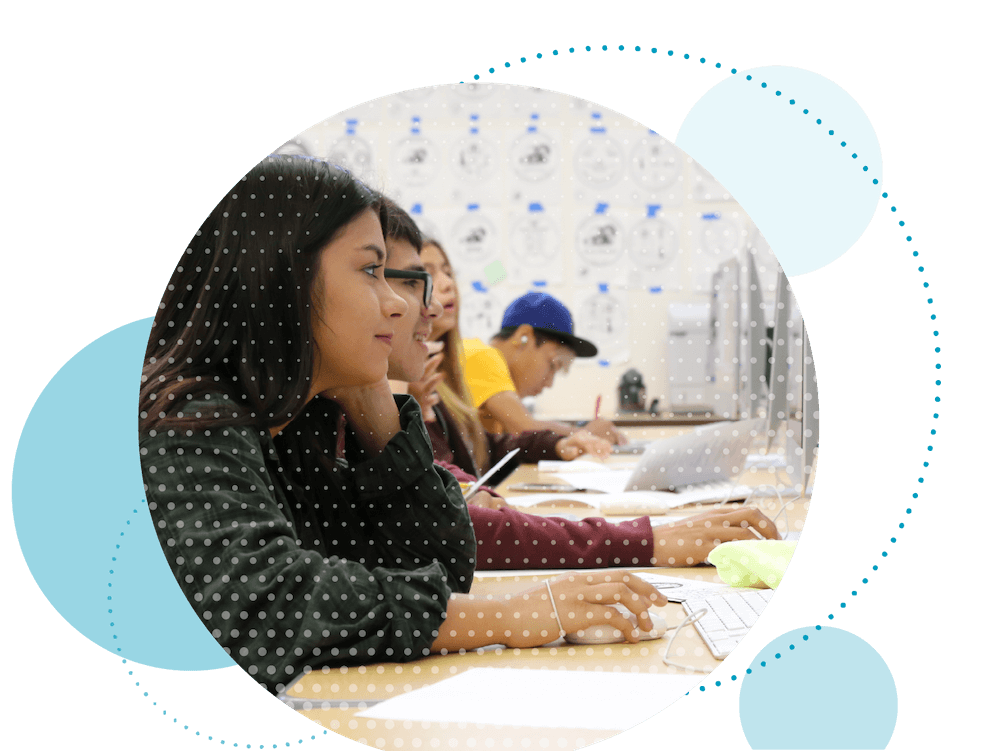Our Network
Network Voice
Alpena High School
Alpena High School teacher John Caplis teaches math at the Alpena Public Schools high school and shares how his experience in a PBL (project-based learning) classroom has shifted his experience as a teacher.
Why do you think project-based learning (PBL) is a good approach for elementary/middle school students?
I have been teaching in a PBL-format and in a traditional classroom since 2012. Project-based learning is important because it addresses important concerns about education. Students learn skills (and soft skills) in addition to content. Students learn in an integrated way rather than studying core subjects in isolation and without real world applications in mind. Developing these skills at an early age, developing these PBL “habits” and the culture of learning, can provide a solid foundation for higher level thinking and learning much sooner than traditional methods of instruction.
What outcomes do you see for students using a project-based learning approach?
Students are more engaged. Students have more control and ownership. When rubrics and self evaluation are incorporated, students become more aware of their skills and learning gaps. They have more control over their learning, and we tap into the benefits of metacognition. Certain foundational elements of PBL, such as rubrics and self-evaluation tools, allow students to become more aware of not only the development of their skills, but also possible gaps in their learning. This plants the seed of metacognition and creates an authorship of learning that results in a higher level of engagement. In a PBL learning environment, students are challenged with problems and must learn critical thinking skills. We also see more collaboration and teamwork; we see a seriousness in the students’ efforts, and they work to put their personal stamp on the project and develop a sense of pride.
Why is authentic learning important?
PBL project design that encourages students to create a project for a real-world audience increases students’ effort and project quality. Students work with stakeholders in the community and work in project teams and learn to collaborate. Working through problems with “co-workers” and “bosses” helps students develop authentic real-world skills. Our community sits adjacent to the Thunder Bay National Marine Sanctuary which hosts the annual Thunder Bay International Film Festival. The festival includes a student film competition with a different theme every year. We have produced student films over the last three years, and the results have been really interesting! All film genres are accepted and our students have produced some really compelling films. Students learn about the sanctuary, science, history, cinematography, production, writing, film editing, etc. They partner with the community and work in teams. Students like the cash prizes, the control they have, the creativity involved, and the connections to their community. We witnessed student growth, from our first project to our second (the film festival) because students shifted from a “high school style project” to a real project. The quality varies, but the best films are high quality and worthy of a public film festival. Nicholas Lusardi, a Junior at Alpena High School, shares his experience with PBL and the Thunder Bay International Film Festival Project.
Tell me about your project for the Thunder Bay International Film Festival. What made you want to choose that subject?
For our film, we had a community partner Alpena City Hall and Stephen Shultz, the city engineer. The film, 2038, is an ambitious fictitious depiction of what the future would look like if private rocket companies were allowed to test and crash mass amounts of equipment in the Great Lakes. It was an environmental awareness PSA. We chose this subject because we wanted to bring awareness to this issue. My classmate, Will Shultz, wrote the film and I wanted to help direct the film because I thought it was an entertaining and creative story.
What PBL skills helped you during the planning and creation phases of your film?
The best part about working on this project was the learning experience. Personally, it was my first time filming with a real camera on a set that wasn’t my living room. I learned the importance of keeping a tidy set and schedule. I also learned how important it is to rewrite your script over and over and to constantly remain aware of your audience. These skills around organization and refinement will be important for any job, not just if we continue making films. It was also my first time collaborating with this many people on such an ambitious script. It was so much fun, and I can’t wait to do more projects like this one!


